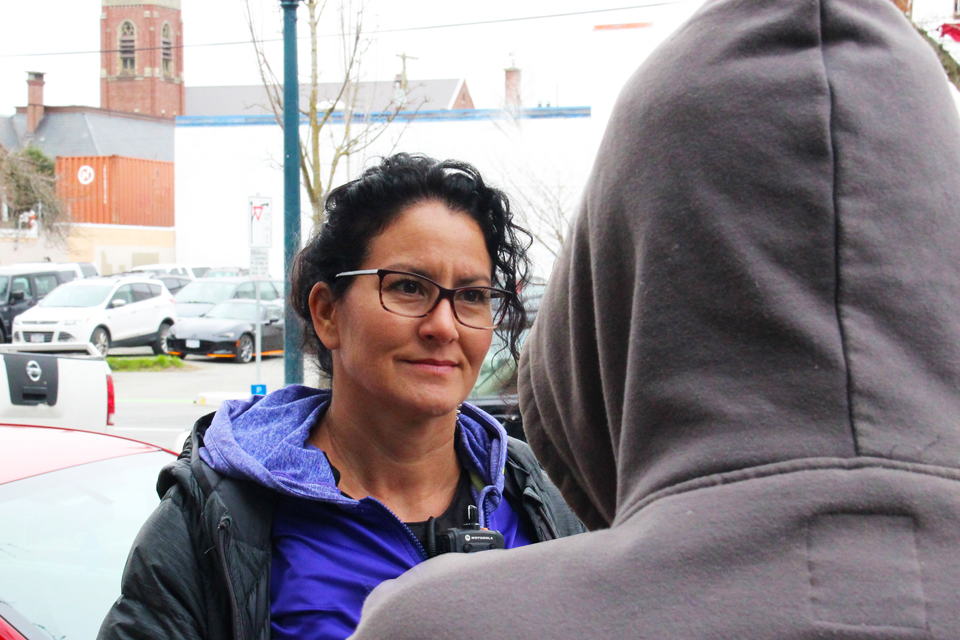New research on ACT teams in Victoria shows benefit of police integration
- Anne MacLaurin

As cases of substance use and mental illness continue to rise across Canada, the City of Victoria is having success with integrating police officers into health care on Assertive Community Treatment (ACT) teams, according to a new report by UVic psychologists Catherine Costigan and Erica Woodin.
The report’s findings have implications well beyond Victoria, documenting for the first time the strengths and challenges of a police presence within the ACT approach.
“Our research suggests that the merging of two important systems—health care and law enforcement—allows each ACT client to be treated as a whole person,” says Costigan, who is also director of clinical training in the Department of Psychology at UVic. “This integration of care may be especially beneficial for ACT clients, who are some of the most vulnerable members of society.”
Police presence on ACT teams is largely unstudied
ACT began in the early 1990s in cities across Canada to help people living with complex mental illnesses and substance use disorders who may have gone without appropriate services because of the limitations of traditional mental health services.
The program has been implemented in the US, Australia and England, and ACT teams exist in most major communities across Canada, including Vancouver. However, police officer integration on ACT teams is uncommon and largely unstudied.
In Victoria, there are four ACT teams serving approximately 300 people: the Downtown Assertive Community Treatment team (DACT), the Pandora Assertive Community Treatment team (PACT), Seven Oaks ACT team, and the Victoria Integrated Community Outreach Team (VICOT). Each team includes social workers, psychiatrists, substance abuse specialists and more recently police officers.
Requested last summer by the Victoria Police Department and Island Health, the UVic report assesses the impact of integrating police officers on local ACT teams made up of outreach workers, social workers, psychiatric nurses, psychiatrists and addiction specialists.
You know, there was a time I was really suicidal and I phoned [an ACT officer] up and [they were] there for me in a heartbeat and got me the help that I needed... – ACT client
The report, Integrating Police Officers onto Assertive Community Treatment (ACT) Teams, is the result of interviews with 21 ACT clients and 22 ACT team staff about their perceptions of the potential benefits and drawbacks of having the three police officers integrated on the teams. It’s an initial evaluation and offers a broad view of the value and disadvantages of integration, as well as suggesting important next steps.
Individual clients have different needs – one size does not fit all
“The needs of the clients are complex, as is the integration of officers on ACT teams. As shown in the research, ‘one-size’ probably does not fit all and this research suggests that teams are able to adopt a flexible approach that recognizes that individual clients have different needs,” says Costigan.
In Victoria, nearly 300 vulnerable people receive support from four Victoria ACT teams and according to Woodin, most of these people will interact with police for a variety of reasons.
“ACT clients come into contact with police because their mental health status makes them vulnerable to victimization, suicide, and difficulties with impulse control,” says Woodin. “The integrated ACT model in Victoria is a great example of a program that leverages the benefits of police knowledge and authority with the often transformative experience of interacting with officers who pair mental health knowledge and de-escalation skills with an impressive level of empathy and respect.”
“In many respects, this report confirms what my officers have been hearing for quite some time from the ACT teams and the clients they help every day,” adds Chief Constable Del Manak of the Victoria Police Department.
“Working as part of integrated, multi-disciplinary teams, police officers have an important part to play in ensuring ACT clients can access the care and services they require.”
Hospital visits and stays decrease
ACT clients are some of the most vulnerable members of society with severe psychosis or drug use issues; with nowhere else to turn, they often receive care from emergency hospital physicians. The number of hospital visits decreases when ACT teams are providing nursing, psychiatry, mental health and addiction outreach and probation.
“Since their inception in 2007, ACT teams have played a crucial role in stabilizing and supporting people with significant mental health challenges to live functionally in their communities,” says John Braun, manager of Mental Health and Substance Use with Island Health.
“ACT clients enjoy improved connections with a range of social, health and community supports, including with police and the judicial system. Once connected with an ACT team, clients have shorter stays in hospital if they are admitted.”
The UVic researchers outline specific next steps, including interviews with police officers, and the perspectives of others, such as, Victoria Integrated Court and staff from supported housing.
“It’s important to identify specific and quantifiable indicators of police impact on teams so that these can be monitored,” says Costigan.
“An important next step is to translate these perceived benefits and drawbacks into measurable metrics of police impact on ACT teams to add an objective lens to the question.”
Find out more
Photos



In this story
Keywords: health, community-engaged research, mental health, psychology, community
People: Catherine Costigan, Erica Woodin




